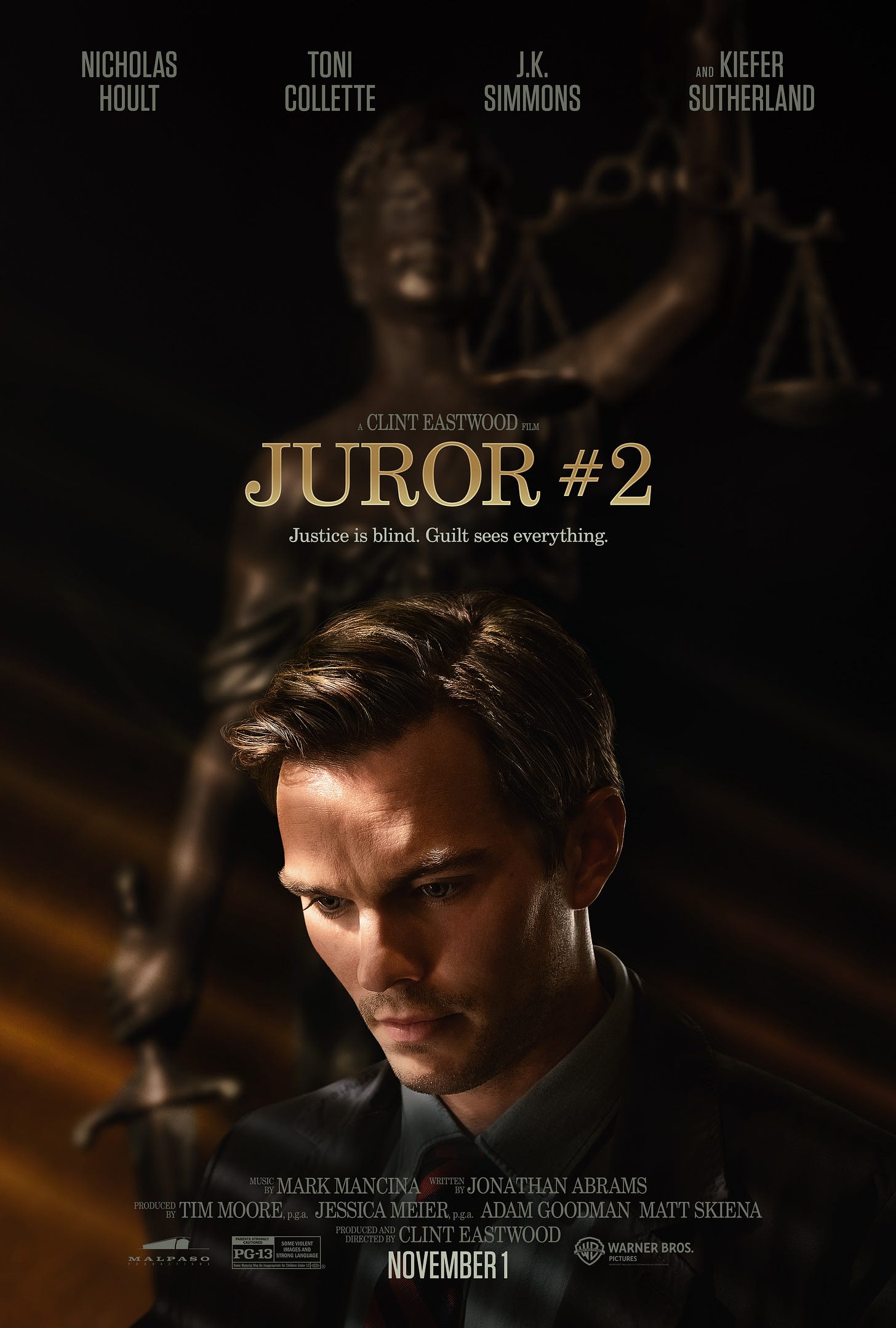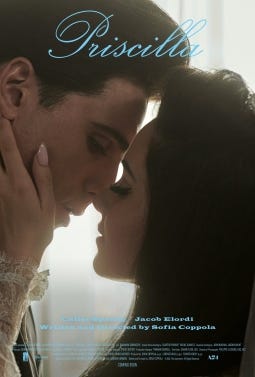"Juror #2": A Lesson in Cruise Control
What do you call a film that's not without merit, but could have found its ending at least 30 minutes prior to the credits? Juror #2...
Contrary to generally favorable reviews of the latest Clint Eastwood film, a courtroom crime procedural throwback to ‘90s Grisham flicks (A Time to Kill, The Rainmaker, The Firm) with glimpses of A Few Good Men (without the Jack Nicholson-caliber acting), Juror #2 [Trailer] is a bit of snooze. My biggest complaint is that it mostly operates on cruise control, completely at ease with its mundanity, with no acceleration or progression in the story or its arc to speak of. Some people love cruise control for its dependable reliability of speed and ambiance, and others; myself included, prefer a bit of an adventure and surprise elements that give you a proper cathartic “a ha” - a sign of pleasure that is derived from time well spent.
Brace yourself, for what is revealed about the story in the first 10 minutes of the film is pretty much it. Despite the quality of the actors faking Southern accents, among which we have the uber-talented Aussie Toni Collette (A Sixth Sense, Muriel’s Wedding), Chris Messina (The Mindy Project), J.K Simmons (Any film worth talking about), Kiefer Sutherland, in a small role, and Brit Nicholas Hoult, who I’m 100% sure went to the Netflix school of Tom Cruise 90s courtroom films for acting because he pretty much lands “The Cruise,” the film finds itself the victim of faulty and inconsistent execution. Ironically, Hoult’s performance also had me missing the Cruise of 90s dramas and begrudgingly admitting to myself how talented Tommy was or is, I guess because those dramas were far better.

The film’s story follows a charming guy, Justin Kemp (Hoult), a recovering alcoholic and new-ish husband. His wife, Allison, a teacher (Zoey Deutch), is pregnant and high-risk. As such, she sits around, knits, rubs her belly, and pines after her hubby, willing him to return from jury duty with the sheer force of her cross stitch and cute, monochrome jersey overall energy. In real life or with a younger director, Allison would most definitely be a momfluencer. This is no cut on high-risk pregnant women, more so a slight on the reductive, out-of-touch archetype Eastwood uses here.
When Kemp returns home at the end of each day, habitually, Allison turns the lights off on him mid-sentence as he stares at the table intensely, leaving him to sit in the dark with his dark thoughts. I wanted to believe there was an underlying reason for this action. Perhaps Eastwood is sneaking in a global warming message, so conserving energy is important to Allison. It’s not entirely unreasonable as far as quack theories go.
The main plot is that Kemp gets chosen to be on a jury for a trial involving the homicide of a young woman, Kendall, played by Clint Eastwood’s daughter (with Frances Fisher), Francesca. Before she died, Kendall was in a relationship with a former gang member who had anger management issues, named James Michael Sythe. The night of her murder, she had a volatile fight with James at a bar, wherein he called her a “Bitch” which resulted in her anger strutting off into the stormy night onto a windy road with a steep drop and no street lamps. An onlooker recorded the entire brawl because that’s, unfortunately, what people do. On that same night, Justin found himself at the bar with James and Kendall, leaving around the same time they did.
<Mic drop>
Things Turn Thoroughly Nonsensical
The trial happens a year after Kendall’s murder. A sober Justin realizes at the jury selection, through a series of flashbacks, that the deer he thought he hit with his car was actually Kendall. He wasn’t drunk that night, but he has DUI priors, so he won’t come clean. This aside, what are the odds that Justin, Kendall, and James were all at the same bar that night and Justin, the perp, is selected to be on the jury?
My biggest BEEF: The medical examiner ruled Kendall’s death a homicide and said the markings on her body were consistent with being attacked. In reality, it was a hit-and-run on a stormy night (far more feasible, a theory), with the hit on her body mirroring someone who was hit by a car. This seems like a major oversight. Can we call a Law & Order forensics consultant? Better yet, let’s just ask Dexter…
A major theme is justice, with the word being employed liberally and even in foreboding shots, like the Lady Justice statue. Toni Collette's prosecutor describes justice as “truth in action,” but Kemp’s character dismantles justice altogether and applies moral ambiguity to those who should be forced to pay for their transgressions. It’s much ado about nada, here, because there’s zero payoff. It’s unclear what is being said about justice beyond it being in the eye of the beholder and c’mon, we all know that.
J.K. Simmon's character is a former detective who is on the jury. Instead of recusing himself, he investigates the case on his own. The whole storyline is absurd.
Summary
Per exhibit A, I enjoy a good thriller/crime and relationship-oriented, emotional drama even more than the average person, but this film was lacking in both departments. Clint Eastwood can do films with heart (The Bridges of Madison County, Million Dollar Baby), but this film fell flat, even with the moral barometer embodied in the Colette character. The psychologically interesting part happens early on when Justin makes the decision to vote against a slam dunk “guilty” conviction, urging the other jury members to consider that the convicted boyfriend, James, could be innocent based on the evidence presented. You might sit there wondering why Justin didn’t take the quick win, or in Monopoly terms, “Pass go and collect $200 [or his freedom].” But of course, his guilt and positive self-perception, cause that’s a part of it, prevented him from behaving in less honorable ways. I enjoyed parts of the jury deliberation because if you’ve ever sat in a team meeting, you get the messy reality of the confluence of differing opinions and how often people flip-flop and are convinced to change their minds. If the film leaned into this a bit more, without the extras, I think it would have made for a worthier Grisham wannabe.
BE SURE TO STAY TUNED FOR JANUARY 4th on CHAT
The big winners’ reveal of our 2024 Best in TV and Film will be on January 4th in the afternoon EST.
» Click here to access the chat.
Twin Films - MUSIC Themed Fun
For January’s Film Chat, we’ll discuss “Twin Films,” which refer to films with the same or similar plots released at different studios at different times.
Baz Luhrmann’s Elvis (2022) on 1/12 and Sofia Coppola’s Priscilla (2023) on 1/19.








Is Eastwood finally slowing down— literally— in his storytelling? He’s wonderful when it comes to a true story.
Beth, I am SO with you on this (and you made me chuckle, I know that Tom Cruise look - I had one on my team once). I'm actually sad that this is likely Clint's final film, not a way for him to close out his brilliance.